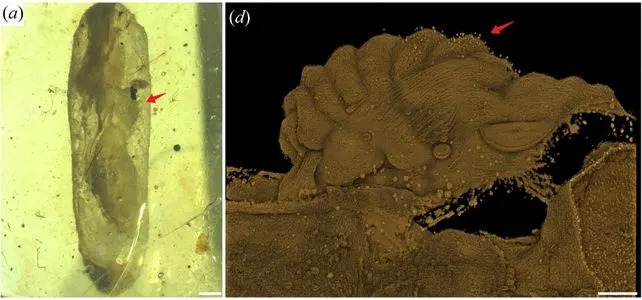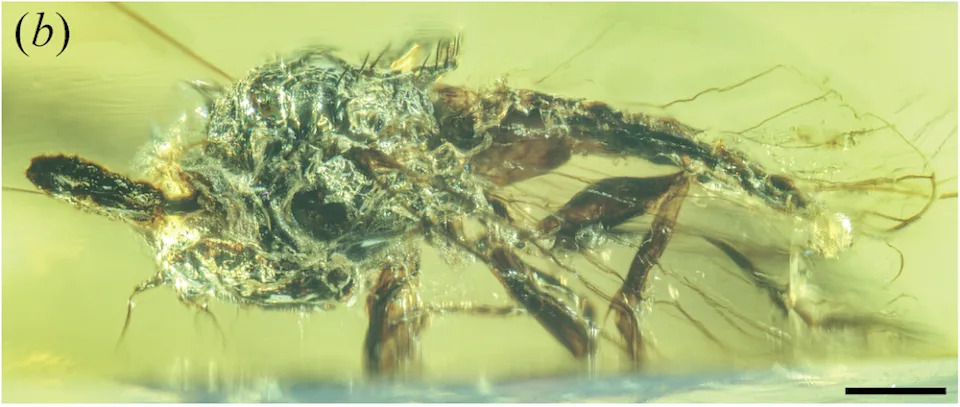'Zombie' Fungus Caught Bursting From Host Bodies 99 Million Years Ago
Scientists have caught ancient parasitic fungi in the act of bursting from insect hosts, in dramatic scenes frozen in amber.
Dating back almost 100 million years, these two specimens are among the oldest evidence of 'zombie' fungus, second only to one early-Cretaceous species discovered back in 2008.
Amber forms over millions of years from the sticky resin of trees, and is renowned for the many bizarre, unique, and enlightening moments it has preserved.
These two pieces, now in the hands of the London Natural History Museum, include the new fungus species Paleoophiocordyceps gerontoformicae, with its tiny spore stalks sprouting from the body of a pupating ant, and P. ironomyiae, in the form of a singular, phallic fruiting body protruding from a fly's head.
Related: Hotter Climate Could Fuel Spread of Dangerous Fungi, Scientists Warn
 P. gerontoformicae growing on an ant pupa, trapped in amber. (Zhuang et al., Proc. R. Soc. B, 2025)
P. gerontoformicae growing on an ant pupa, trapped in amber. (Zhuang et al., Proc. R. Soc. B, 2025)These newfound species appear to share traits with living relatives, Ophiocordyceps, that continue to infect insects as a means of spreading their spores.
Scientists think the Paleoophiocordyceps species may have separated from Ophiocordyceps around 130 million years ago.
 P. ironomyiae and its fly host in amber. (Zhuang et al., Proc. R. Soc. B, 2025)
P. ironomyiae and its fly host in amber. (Zhuang et al., Proc. R. Soc. B, 2025)"The fossil evidence shows that the infectious fungi were already adapted to two different insect hosts a hundred million years ago, an ant and a true fly," says paleoentomologist Edmund Jarzembowski from the Natural History Museum.
"This suggests that the fungus made this jump to other insects as they diversified with the rise of flowering plants and new insect groups, especially moths and butterflies."
The research is published in Proceedings of the Royal Society B.
Related News
100-Million-Year-Old Rock Reveals 40 Never-Before-Seen Squid Species
Sea Slugs Steal Body Parts From Prey to Gain Their Powers
Earth Is Pulsing Beneath Africa Where The Crust Is Being Torn Apart
How astonishingly weird! Fossil evidence of Zombie fungus bursting forth from its host bodies over 98 million years ago tells a gruesome yet fascinating tale about the resonance between life and death beneath our feet, challenging natural science norms.
The discovery of 'Zombie' Fungus 99 Million Years Ago provides a chilling insight into ancient microbial hijacking and symbiotic relationships that once prevailed deep in the Earth’s history, igniting new questions about life forms beyond human comprehension.
The 'Zombie' fungus found preserved within fossilized host bodies from 9.6 million years ago offers a haunting reminder of microbiological parasitic resilience in the face of extinction, challenging our understanding about life’s indomitable capacity.
The discovery of 'Zombie' Fungus erupting from ancient host bodies dating back 9.6-25 million years underscores the fascinating and unprecedented biodiversity in extant organisms that confront our understanding.
Astonishingly, the 'Zombie' Fungus was caught leaving bursting remnants from its hoarded 9.3 million-year old host bodies when uncovered recently in highly preserved state.
The discovery of Zombie Fungus trapped within fossilized host bodies, evidence for an unprecedented 9 nine million-year bursting is a startling testimony to the resilience and potential dormancy period displayed by fungi in nature.
The article ‘Zombie’ Fungus Caught Bursting From Host Bodies 93 Million Years Ago provides a remarkable insight into the prehistoric prevalence of parasitism, reminding us that even ancient species were not immune to reanimating forms with devastating bouts.
The discovery of 'Zombie' Fungus that was retained in host bodies for a staggering 9.百万年(millennia), challenging biological concepts on parasitism and decay, reflects the intricate interconnectedness within our natural world.














